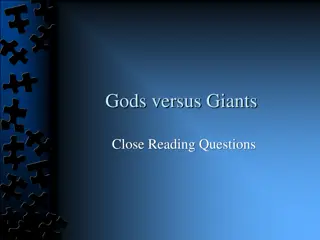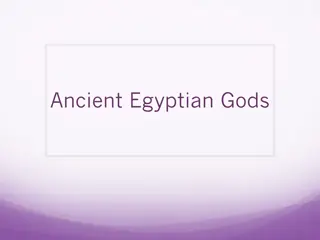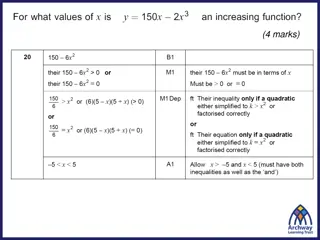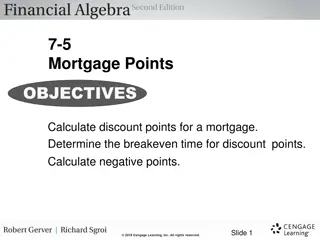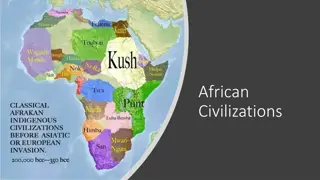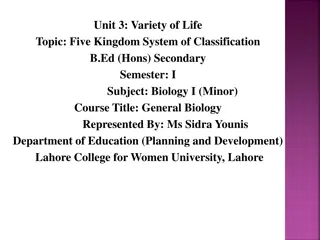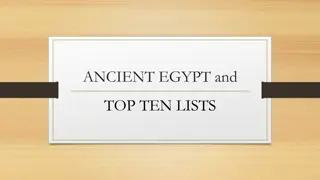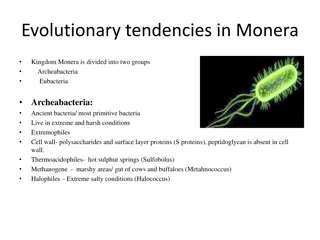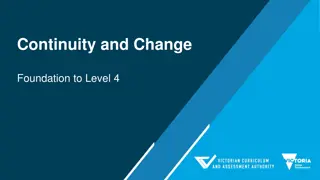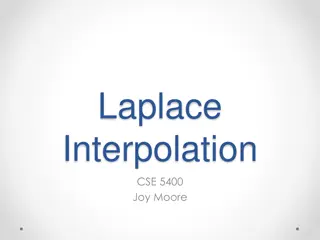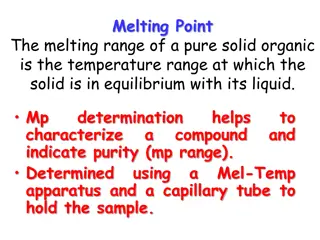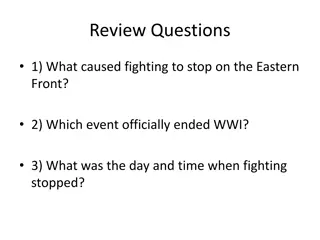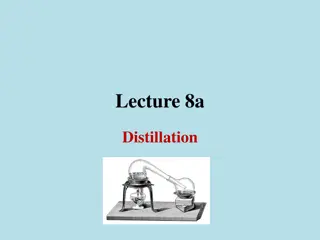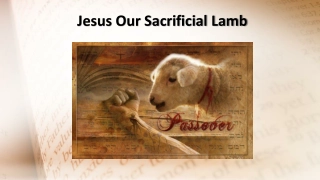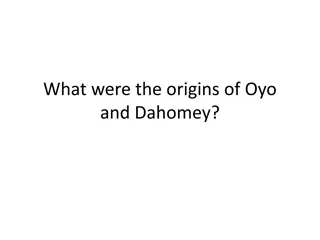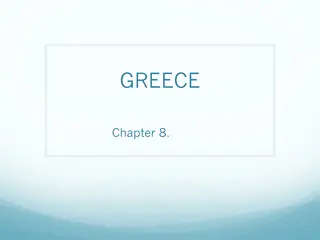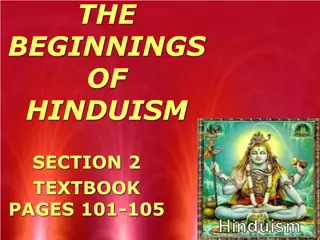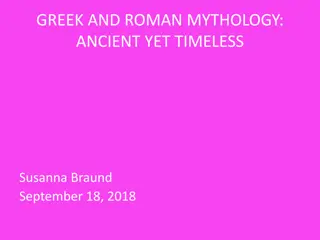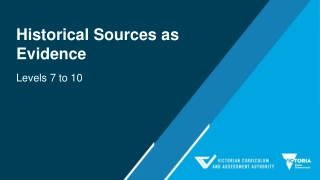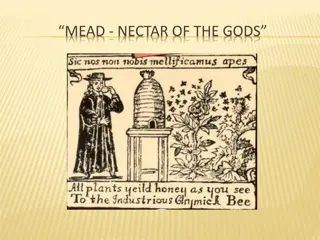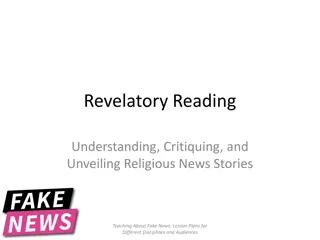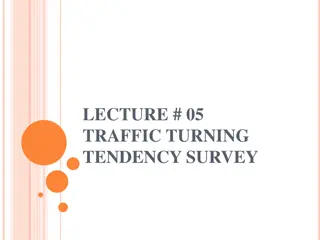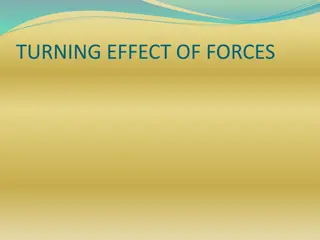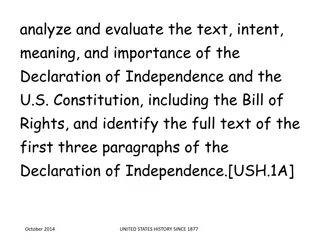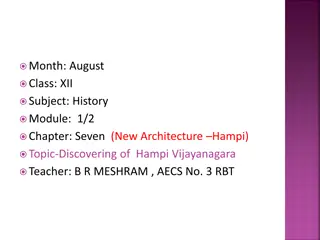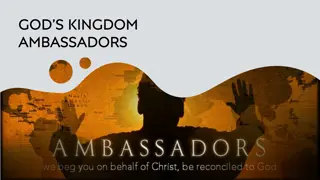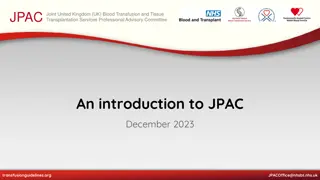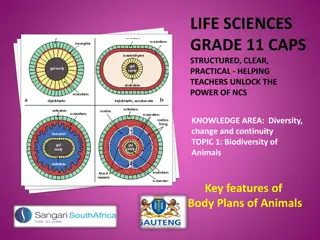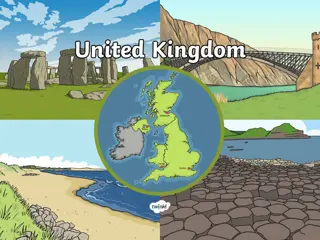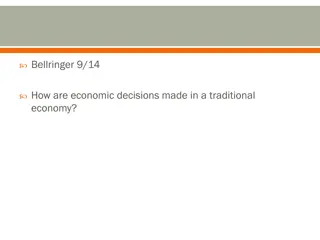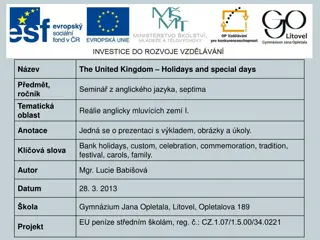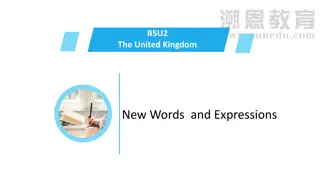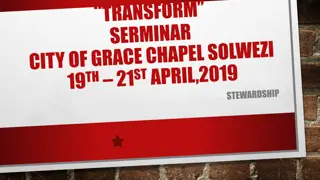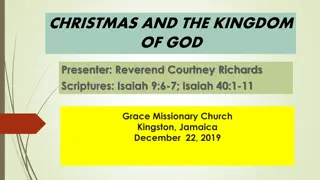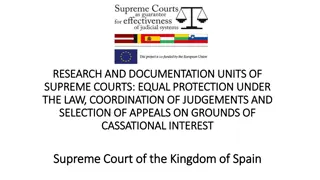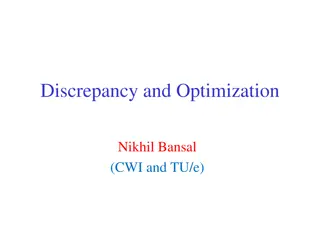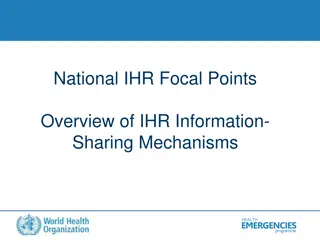Unveiling Historical Turning Points in God's Kingdom
History in church resembles a swinging pendulum, with significant "turning points" marking key moments. Uncover foundational and united tasks in God's kingdom through this enlightening session by Dr. Rich McLaughlin at The Moody Bible Institute.
Download Presentation

Please find below an Image/Link to download the presentation.
The content on the website is provided AS IS for your information and personal use only. It may not be sold, licensed, or shared on other websites without obtaining consent from the author. Download presentation by click this link. If you encounter any issues during the download, it is possible that the publisher has removed the file from their server.
E N D
Presentation Transcript
INTRO TO CHURCH HISTORY SESSION #6 2/06/2020 The Moody Bible Institute Rich McLaughlin, PhD
CONCEPTUALLY History swinging forward like pendulum
CONCEPTUALLY Turning points marked with stones
Understanding Foundational & United Tasks in God s Kingdom Dr. Ralph Winter s Perspective Course Terms Ephesians 4:11-13 Applications Evangelism Sodality Missions Band Monastery Apostles Prophets Evangelists Missionaries Church Planters Evangelists Discipleship Modality Synagogue Diocese Pastors Teachers Prophets Shepherds Teachers Small Group Leaders Sunday School Class Workers
Dates & Memorial Stones related to our 7 Turning Points
Person of God [God himself, his purposes, his ways] WEEKLY PROCESSING Who? Person in History What? Turning Point Scripture applied in the Present Praise from the Past Prayer for the Future
TURNING POINTS & IRON SHARPENING IRON ACROSS CHURCH HISTORY Iron sharpens iron, and one man sharpens another. Prov 27:17
ATHANASIUS (296-373) & C.S. LEWIS (1898-1963) Introduction to Athanasius On the Incarnation
There is a strange idea abroad that in every subject the ancient books should be read only by the professionals, and that the amateur should content himself with the modern books. Thus I have found as a tutor in English Literature that if the average student wants to find out something about Platonism, the very last thing he thinks of doing is to take a translation of Plato off the library shelf and read the Symposium Introduction to Athanasius On the Incarnation by C.S. Lewis
He would rather read some dreary modern book ten times as long, all about isms and influences and only once in twelve pages telling him what Plato actually said. The error is rather an amiable one, for it springs from humility. The student is half afraid to meet one of the great philosophers face to face. He feels himself inadequate and thinks he will not understand him. But if he only knew, the great man [or woman], just because of his [or her] greatness, is much more intelligible than his modern commentator Introduction to Athanasius On the Incarnation by C.S. Lewis
This mistaken preference for the modern books and this shyness of the old ones is nowhere more rampant than in theology. Wherever you find a little study circle of Christian laity you can be almost certain that they are studying not St. Luke or St. Paul or St. Augustine or Thomas Aquinas or Hooker or Butler, but M. Berdyaev or M. Maritain or M. Niebuhr or Miss Sayers or even myself Introduction to Athanasius On the Incarnation by C.S. Lewis
A new book is still on its trial and the amateur is not in a position to judge it. It has to be tested against the great body of Christian thought down the ages, and all its hidden implications (often unsuspected by the author himself) have to be brought to light. Often it cannot be fully understood without the knowledge of a good many other modern books. If you join at eleven o clock a conversation which began at eight you will often not see the real bearing of what is said. Remarks which seem to you very ordinary will produce laughter or irritation and you will not see why the reason, of course, being that the earlier stages of the conversation have given them a special point Introduction to Athanasius On the Incarnation by C.S. Lewis
AUGUSTINE (354-430) & LUTHER (1483-1546) Augustinian monastic order & Augustinian theology
Humanity as Created and Fallen Humanity as createdFallen humanity Free will Liberty The ability to sin yes yes yes yes no yes The ability not to sin yes no The inability not to sin The consequences of ideas by R.C. Sproul no yes Chapter 4 - Augustine: Doctor of Grace Page 63
FORERUNNERS OF REFORMATION - BEFORE NEXT TURNING POINT: (1329-1481)
JOHN WYCLIFFE 1329 - 1384
John Wycliffe Biographical Details 1329-1384 Professor at Oxford University Lordship doctrine favored by English nobles Forced into retirement as a result of Peasants Revolt (1381) Translated most of Vulgate into English His body was exhumed and burned in 1428. Chronological and Background Charts of Church History by Robert C. Walton
John Wycliffe Challenges to the Church Doctrine Denied transubstantiation Practice Opposed church s accumulation of wealth, sale of indulgences Authority Emphasized authority of Scripture Chronological and Background Charts of Church History by Robert C. Walton
JOHN HUS 1373 - 1415
John Hus Biographical Details 1373-1415 Bohemian priest Professor at University of Prague Burned at stake by order of Council of Constance Chronological and Background Charts of Church History by Robert C. Walton
John Hus Challenges to the Church Doctrine Defined church by Christlike living rather than by sacraments Practice Opposed sale of indulgences, veneration of images Authority Emphasized authority of Scripture Chronological and Background Charts of Church History by Robert C. Walton
JOHN WESSEL (WESSEL GANSFORT) 1419/1420 - 1489
John of Wessel (Wessel Gansfort) Biographical Details 1419/1420-1489 Dutch theologian and professor Died in prison after being convicted of heresy and after recanting Chronological and Background Charts of Church History by Robert C. Walton, &
John of Wessel (Wessel Gansfort) Challenges to the Church Doctrine Emphasized grace of God in salvation, Denied transubstantiation Practice Opposed sale of indulgences, priestly celibacy Authority Emphasized authority of Scripture Chronological and Background Charts of Church History by Robert C. Walton, &
LUTHERS LIFE & IMPACT: WHAT STANDS OUT? Please share with each other from the reading and any other accumulated background.
MARTIN LUTHER 1483-1546
TURNING POINT The Diet of Worms (1521)
Nolls Historical Turning Point Biblical Principle/Passage Current Application Question Ch. 1 Fall of Jerusalem Witnessing/ Acts 1:8 Teaching/ Matt 28:16-20 Community/ Acts 2:42-45 [Living, Teaching, Witnessing] What prompts our witness? Ch. 2 Council of Nicaea What is our central teaching? Ch. 4 Monasticism How do we live it out together? Ch. 5 Culmination of Christendom Papal Power & Earthly Rule? [Strategic Alliance?] Ch. 6 The Great Schism Separating/ Rev 18:4 Come out of her, my people Reforming/ (teaching/structures) Five Solas When/How must we separate? Ch. 7 The Diet of Worms When/How must we reform?
A BOLT OF LIGHTNING RIVED THE GLOOM AND KNOCKED THE MAN TO THE GROUND. STRUGGLING TO RISE, HE CRIED IN TERROR, ST. ANNE, HELP ME! I WILL BECOME A MONK. Great church historian and biographer of Luther, Roland Bainton (Sproul, R.C., The Holiness of God, pp. 76-77)
WHO AM I, THAT I SHOULD LIFT MINE EYES OR RAISE MY HANDS TO THE DIVINE MAJESTY? THE ANGELS SURROUND HIM. AT HIS NOD THE EARTH TREMBLES. AND SHALL I, A MISERABLE PYGMY, SAY I WANT THIS, I ASK FOR THAT?... Great church historian and biographer of Luther, Roland Bainton (Sproul, R.C., The Holiness of God, pp. 79-80)
LOOK HERE (HIS FATHER CONFESSOR) SAID, IF YOU EXPECT CHRIST TO FORGIVE YOU, COME IN WITH SOMETHING TO FORGIVE-PARRICIDE, BLASPHEMY, ADULTERY-INSTEAD OF ALL THESE PECCADILLOES Great church historian and biographer of Luther, Roland Bainton (Sproul, R.C., The Holiness of God, p. 85)
LUTHER & KEY BIBLICAL STUDIES Romans, Psalms, & 1 Corinthians
FOR THE FOOLISHNESS OF GOD IS WISER THAN MAN S WISDOM, AND THE WEAKNESS OF GOD IS STRONGER THAT MAN S STRENGTH. 1 Corinthians 1:25
LUTHER & PARADOX
HOW DID THIS ERA VALUE GOD S WORD?
THE FIVE SOLAS Five Latin phrases from the Reformation summarizing the Reformers theological convictions.
1) SOLA SCRIPTURA Scripture alone [2 Tim 3:16-17]
ALL SCRIPTURE IS BREATHED OUT BY GOD AND PROFITABLE FOR TEACHING, FOR REPROOF, FOR CORRECTION, AND FOR TRAINING IN RIGHTEOUSNESS,THAT THE MAN OF GOD MAY BE COMPLETE, EQUIPPED FOR EVERY GOOD WORK. 2 Timothy 3:16-17 (ESV)
2) SOLA FIDE Faith alone [Eph 2:8-9]
3) SOLA GRACIA Grace alone [Eph 2:8-9]
FOR BY GRACE YOU HAVE BEEN SAVED THROUGH FAITH. AND THIS IS NOT YOUR OWN DOING; IT IS THE GIFT OF GOD, NOT A RESULT OF WORKS, SO THAT NO ONE MAY BOAST. Ephesians 2:8-9 (ESV)
4) SOLUS CHRISTUS Christ alone [John 14:6; Acts 4:12]
JESUS SAID TO HIM,I AM THE WAY, AND THE TRUTH, AND THE LIFE. NO ONE COMES TO THE FATHER EXCEPT THROUGH ME. John 14:6 (ESV)
AND THERE IS SALVATION IN NO ONE ELSE, FOR THERE IS NO OTHER NAME UNDER HEAVEN GIVEN AMONG MEN BY WHICH WE MUST BE SAVED. Acts 4:12 (ESV)
5) SOLI DEO GLORIA To the glory of God alone [1 Corinthians 10:31]
SO, WHETHER YOU EAT OR DRINK, OR WHATEVER YOU DO, DO ALL TO THE GLORY OF GOD. 1 Corinthians 10:31 (ESV)
Person of God [God himself, his purposes, his ways] WEEKLY PROCESSING Who? Person in History What? Turning Point Scripture applied in the Present Praise from the Past Prayer for the Future
PRAYER Luther s prayer after asking for 24 hours to think about his decision at the Diet of Worms


